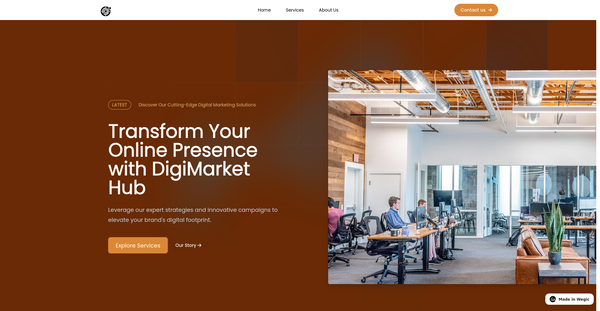Best Website to Create a To-Listen to List Best Practices
How to Best Website to Create a To-Listen to List
Best Website to Create a To-Listen to List
In the ever-evolving landscape of digital marketing, content marketing SEO has become a crucial strategy for businesses looking to increase their online visibility and attract more organic traffic to their websites. Content marketing SEO is the practice of creating high-quality, relevant content that is optimized for search engines in order to improve a website’s search ranking and drive more traffic to the site.

The Benefits of Best Website to Create a To-Listen to List
Best Website to Create a To-Listen to List
Web app development involves creating software programs that are accessed through a web browser. Unlike traditional desktop applications that are installed on a user’s device, web apps are hosted on a server and can be accessed from any device with an internet connection. This makes them highly versatile and convenient for users who need to access their information on-the-go.
The process of web app development starts with defining the project requirements and objectives. This involves understanding the target audience, the goals of the app, and the features that will be included. Once the requirements have been gathered, the next step is to create a wireframe or mockup of the app to visualize the layout and design.
After the wireframe has been approved, the development team can start coding the app. Web apps are typically built using a combination of front-end and back-end technologies. The front-end is responsible for the user interface and user experience, while the back-end handles the server-side logic and database management.
For the front-end development, developers often use HTML, CSS, and JavaScript. HTML (Hypertext Markup Language) is used to create the structure of the web page, while CSS (Cascading Style Sheets) is used to style and layout the content. JavaScript is used to add interactivity and dynamic elements to the app, such as animations and form validation.
In addition to these core technologies, developers may also use frameworks and libraries such as Angular, React, or Vue.js to streamline the development process and enhance the functionality of the app. These tools provide pre-built components and modules that can be easily integrated into the app, saving time and effort for the developers.
On the back-end side, developers use server-side languages such as Node.js, Ruby on Rails, or Python to handle the business logic of the app. These languages allow developers to create APIs (Application Programming Interfaces) that communicate with the front-end and database, enabling data to be stored, retrieved, and manipulated.
Databases are an essential component of web app development, as they store and manage the app’s data. Common database systems used in web development include MySQL, MongoDB, and PostgreSQL. Developers use SQL (Structured Query Language) to interact with the database and perform queries to fetch and update data.
Once the front-end and back-end components have been developed, the next step is to test the app for bugs and performance issues. Quality assurance (QA) testing involves checking the app’s functionality, usability, and security to ensure it meets the project requirements and user expectations.
After the app has been thoroughly tested, it is ready for deployment. Web apps are typically hosted on a web server or cloud platform, such as AWS or Azure. This allows users to access the app through a URL in their browser, without needing to install any software on their device.
First and foremost, it’s important to understand the different types of web hosting available. The most common types of web hosting are shared hosting, VPS (Virtual Private Server) hosting, dedicated hosting, and cloud hosting.
Shared hosting is the most basic and cost-effective form of web hosting, where multiple websites are hosted on a single server. This means that resources such as storage, bandwidth, and processing power are shared among all websites on the server. While shared hosting is suitable for smaller websites with low to moderate traffic, it may not be the best option for high-traffic or resource-intensive websites.
VPS hosting is a step up from shared hosting, where a physical server is divided into virtual servers, each with its own dedicated resources. This provides more control and flexibility compared to shared hosting, making it a good option for websites that require more resources but do not need a dedicated server.
Dedicated hosting involves renting an entire server for your website, giving you complete control over resource allocation and security. This type of hosting is ideal for high-traffic websites or e-commerce sites that require robust security and performance.
Cloud hosting is a newer form of web hosting that utilizes multiple interconnected servers to provide scalable and reliable hosting services. With cloud hosting, resources are distributed across multiple servers, ensuring high uptime and performance. Cloud hosting is suitable for websites that experience fluctuating traffic or unpredictable resource demands.
When comparing web hosting providers, there are several factors to consider:
1. Uptime and reliability: Look for a web hosting provider with a high uptime guarantee, ideally 99.9% or higher. A reliable hosting provider will ensure that your website is always accessible to users.
2. Performance and speed: Choose a hosting provider that offers fast loading times and efficient server performance. Slow-loading websites can deter users and negatively impact your search engine rankings.
3. Security: Make sure the hosting provider offers robust security measures, such as SSL certificates, regular backups, and malware protection, to protect your website from cyber threats.
4. Scalability: Consider whether the hosting provider offers scalability options that allow you to easily upgrade your hosting plan as your website grows.
5. Customer support: Look for a hosting provider that offers responsive customer support, preferably 24/7, to address any technical issues or concerns that may arise.
Now, let’s compare some popular web hosting providers:
1. Bluehost: Bluehost is a well-known web hosting provider that offers a range of hosting options, including shared, VPS, and dedicated hosting. Bluehost is known for its reliable uptime, fast loading times, and excellent customer support. Pricing starts at $2.95 per month for shared hosting.
2. SiteGround: SiteGround is another popular web hosting provider that is known for its high performance, security features, and responsive customer support. SiteGround offers shared, VPS, and cloud hosting options, with pricing starting at $6.99 per month for shared hosting.
3. HostGator: HostGator is a budget-friendly web hosting provider that offers a variety of hosting plans, including shared, VPS, and dedicated hosting. HostGator is known for its easy-to-use interface, uptime guarantee, and affordable pricing. Shared hosting plans start at $2.75 per month.
4. A2 Hosting: A2 Hosting is a high-performance web hosting provider that offers a range of hosting options, including shared, VPS, and dedicated hosting. A2 Hosting is known for its fast loading times, excellent uptime, and developer-friendly features. Shared hosting plans start at $2.99 per month.
5. InMotion Hosting: InMotion Hosting is a reliable web hosting provider that offers a variety of hosting plans, including shared, VPS, and dedicated hosting. InMotion Hosting is known for its fast loading times, excellent customer support, and free website migration services. Shared hosting plans start at $6.99 per month.

Best Website to Create a To-Listen to List Best Practices
Best Website to Create a To-Listen to List
In conclusion, church website builders are valuable tools for churches looking to create a strong online presence and engage with their congregation. With their user-friendly interfaces, customizable templates, and range of features, these platforms make it easy for churches to create a professional and engaging website. Whether you are looking for stylish design options, robust features, or responsive design capabilities, there is a church website builder out there to meet your needs. By choosing the right website builder for your church, you can enhance your online presence, reach a wider audience, and better connect with your community.


